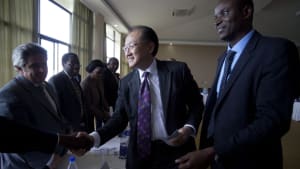
As some of the largest global development institutions are undergoing internal reform processes to make their operations more effective and deliver value for money, a common question is how staffing will be affected.
Whether the issue is how the organization is being run, relocating to the global South, changing job titles, moving from one department to another, assuming different (and sometimes even additional) responsibilities or even being laid off, employees of the World Bank, the U.N. Development Program, the now-defunct AusAID or Oxfam International are becoming increasingly concerned about how those reforms will eventually play out — and affect their own positions within the new organizational structures.
This week, the Huffington Post published a leaked internal survey of more than 13,000 World Bank staff which showed that less than half — 42 percent — of respondents said they "have a good understanding of the direction" of the ambitious reforms initiated by President Jim Kim, while only 35 percent agreed that senior management "creates a culture of openness and trust,” and 39 percent believe that managers empower staff to perform to the best of their abilities.
But this is nothing new.
Human nature is generally averse to change, and more so in an institution like the World Bank, known for a strong internal culture among staff that — according to its critics — is stuck in an old-fashioned approach to development that is wary of dissent and risk takers like Kim.
And it’s also quite human to feel anxious in situations like that of Australia’s Department of Foreign Affairs and Trade, which by July 1 must release the list of hundreds of former AusAID employees that will be made redundant with the integration of the aid agency into DFAT. Likewise, UNDP staff now know that 10 percent of the U.N. agency’s workforce will be cut, and personnel from Oxfam still don’t know exactly where the iNGO’s new global secretariat will be located — with Bangkok, Johannesburg and Nairobi as the most likely options.
Yet another reason for staff — particularly expats — to be concerned was raised in no uncertain terms last week at the first Devex Career and Partnerships Forum in Manila.
During one of the plenary sessions, recruiters from top organizations like RTI International, Engility or UNICEF made it quite clear that international staff is going to have a much harder time finding jobs in countries like Indonesia or the Philippines, where local capacity has been built and expats are just not as necessary as they used to be. That’s the downside, for some, of going local.
However, there is some promising news.
The buzz within the aid community in Asia is that the future China-led regional multilateral development bank for Asia, tentatively named Asian Infrastructure Development Bank, will soon go on a hiring blitz, seeking the best and brightest to join their ranks. We plan to pay very close attention to these developments, and keep you informed.
Read more development aid news online, and subscribe to The Development Newswire to receive top international development headlines from the world’s leading donors, news sources and opinion leaders — emailed to you FREE every business day.








